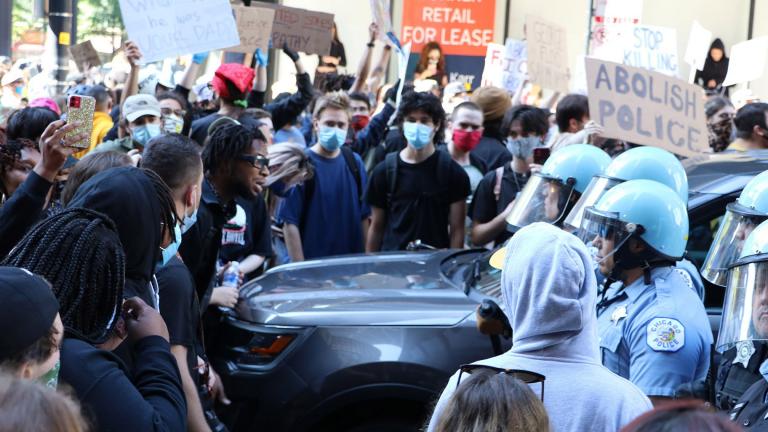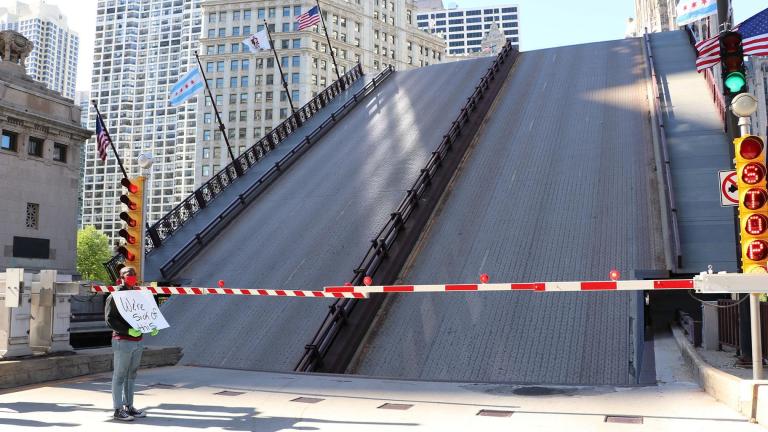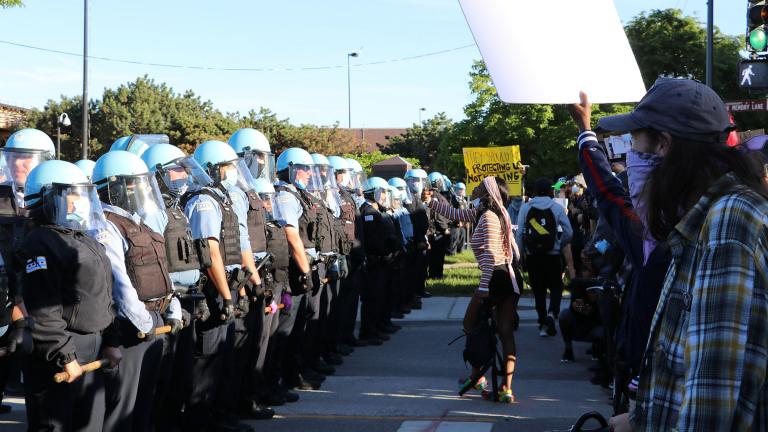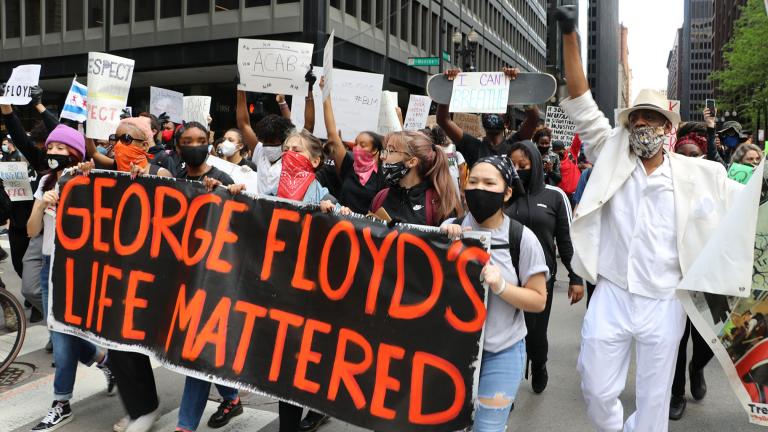Mayor Lori Lightfoot has issued a series of reform directives to the Chicago Police Department to be implemented over the next 90 days, following ongoing protests and unrest across the city and country in response to the police killing of George Floyd in Minneapolis.
In an address Tuesday night, the mayor outlined reforms based on improving police training, officer wellness and community relations she said are “critical to resolving our crisis.”
“Let’s get it done,” she said, “and (Police Superintendent David Brown) and the Department must be totally transparent in these efforts. This is just a start, not the end of our journey for police reform and accountability.”
More: Read the mayor’s prepared remarks for her “State of the City” address.
Lightfoot, the former head of the Chicago Police Board, criticized the current consent decree process of police reform as both “too slow and too narrowly focused.” She has instead issued directives to Brown on four specific measures to be implemented in the next three months.
Those include:
- Improved officer training. This includes bringing community members into the police academy to act as teachers to instruct officers about the history of their neighborhoods from their own perspectives.
- Crisis intervention and procedural justice training for all officers to better educate them on de-escalation strategies.
- Officer wellness programs that provide peer support and counselors to those in crisis.
- A new recruit program focused on police-community relations and community policing.
Lightfoot’s emotional address follows waves of unrest in response to Floyd’s killing, which she said evoked “the long history of violence against African Americans” both in Chicago and across the country.
“More specifically here in Chicago,” she said, “it is about Laquan McDonald. Quintonio LeGrier. Rekia Boyd. And Jon Burge.”
The mayor’s comments came as thousands of Chicagoans marched in protests on the North and South sides of the city Tuesday evening. The events were largely peaceful compared to previous days when businesses were looted in neighborhoods across the city.
Lightfoot said she stands with those who believe in the power of non-violent social change, but added she draws a “sharp line” between those expressing their First Amendment rights and those committing “criminal conduct.”
“We support and uplift what’s right and strongly condemn what’s wrong,” she said. “My heart is broken over what has happened here in the city that I love.”
Earlier in the day, Lightfoot announced the city would proceed into the next phase of reopening on Wednesday as scheduled, after previously expressing concern that this transition could be delayed by the ongoing protests.
On Tuesday night, Lightfoot also said the city will launch a $10 million program to support businesses that have been most harmed by riots and looting in recent days. The funds will be provided citywide, but with an equity weighting focused on the South and West sides.
“So we will clean up these broken windows, but we can’t stop there. We must also clean up and repair our broken systems,” she said. “Not just by ending the violence we’ve seen here, but by reimagining our city, and what our city means for every neighborhood and every community.”
Contact Matt Masterson: @ByMattMasterson | [email protected] | (773) 509-5431
State of the City – George Floyd Protests
June 2, 2020
Good evening, my fellow Chicagoans.
Tonight, I want to discuss the events that have unfolded across our city over these past few days.
The steps forward that our great, resilient, and strong city will be taking to recover and to heal in the weeks and months ahead.
And the hope I feel about the future—despite this most difficult moment.
Over the last few days, like many of you, I have experienced a series of difficult emotions: anger, frustration, despair, intense physical and emotional fatigue, and yes…also hope.
Let me first address the heartbreak many of us are experiencing. I have watched all of the video coverage of George Floyd’s encounter with the four, shameful Minneapolis police officers who took his life.
I say all four, and not just the one who had his knee on his neck. All four were complicit. None followed their training, none intervened, and all felt entitled to abuse the privilege and honor of their badge to rob George Floyd of his humanity, his future and his life.
None shied away from the brazenness of their conduct even as Mr. Floyd cried out for his life. Thank goodness for the bystanders who stopped, trained their cameras on this obvious injustice and preserved that moment for the rest of us to bear witness.
The collective trauma and outrage arising from George Floyd’s murder have reverberated in our city and across our country.
For Black Americans—our history is paved with the racism and violence of the original sin of slavery, the open wounds from the slave masters’ whips, the rope marks from the lynching tree, blood spilled by the billy club, the dogs and the fire hoses—to all of that, we now must add a knee to the neck to the list of violence intended to break us.
Here in Chicago, the murder of George Floyd evoked a long history of violence against African-Americans in this country.
More specifically here in Chicago, it is about Laquan McDonald. Quintonio LeGrier.
Rekia Boyd. And Jon Burge.
And if we’re being honest, it goes back at least as far as the Red Summer in 1919, and many other events before and since.
It’s about a fear that I confess I still feel, when I think about how the world will see my young Black daughter.
It’s for that very reason that I stand with those who are sick and tired of the lack of fundamental change. Change that results in the respect, dignity, and freedom that Black people deserve in this country.
To the thousands of people here in Chicago and across the country who engaged in peaceful, non-violent protests for change, I stand with you.
To those who have come out to express our shared righteous indignation in ways that give honor to George Floyd and are consistent with the life and legacy of Mahatma Gandhi, the Rev. Dr. Martin Luther King and so many others who believe in the power of non-violent social change, I stand with you.
However, I must draw a sharp line between the righteous and the wrong, the hopeful and the cynical. We cannot conflate legitimate First Amendment expression with criminal conduct. Those acts are separate.
We support and uplift what’s right and strongly condemn what’s wrong.
- I will never stand for letting our pain spill over into violence and destruction against our communities.
- I will never stand for stealing the dreams and livelihoods of our neighbors.
- I will never stand for abandoning our values and our love of this city.
My heart is broken over what has happened here in the city that I love. I have seen firsthand the piles of shattered glass and empty shelves.
I do not mourn for that glass, or for those shelves.
I mourn for the son in Hyde Park who’s piecing back together the 50-year-old store that his parents built in the face of racism from Jim Crow.
I mourn for the daughter whose father’s dream of a family-owned shoe store that has supported his family for the past fifty years turn into a nightmare overnight.
I mourn for our young people who are clearly hurting, who don’t see a future, for whom the light of hope in their eyes is dimming . . . and is in danger of being extinguished.
My resolve is certain and clear. We will not leave our neighbors behind. As a city, I charge us to stop at nothing to ensure that the businesses we have lost come back to serve and support our neighbors, that the dreams of our young people are not lost, and that our path toward a more fair and just world remains within our reach.
But I don’t forget about the other part of my heart that is broken. It’s broken over a different form of violence, a form that is always with us, a form that produces the desperation and despair that boils up in moments like these.
It is what Bobby Kennedy called “another kind of violence, slower but just as deadly, destructive as the shot or the bomb in the night…the violence of institutions; indifference and inaction and slow decay. This is the violence that afflicts the poor, that poisons relations between men because their skin has different colors. This is a slow destruction of a child by hunger, and schools without books and homes without heat in the winter.”
We see it throughout our city. It manifests as a life expectancy gap that is exposed within a 15-minute drive between adjoining neighborhoods. As a city where 44% of all households don’t earn enough to cover essentials like housing, child care, food, transportation and health care.
We must recognize that this has deep roots in our history. These are the products of a system of violence buried deep in our institutions, that must be rooted out. It calls us to look deep into our organizations, our decisions, and our hearts to reconcile and account for the sins and harms of those before us. Because if we don’t, we bear the weight. We feel the pain. We live with the destruction.
I love this City deeply. It has been over 30 years since I first began my life here. This is the place that made me the woman I wanted to be. Just as it has for millions of others today and throughout our history. I am a Chicagoan.
And as a Chicagoan, I am a fighter. I don’t back down from a challenge. And I protect what I love.
This is our challenge. We know what we must do. We have always known. Full justice, true justice—equity and inclusion amongst all human beings is the only solution. And I am hopeful because of what I have also seen from many of fellow Chicagoans over the past few days through their resilience, hope in moments of despair, and dedication to our City. And here I must thank thousands of our own city workers—including police, transit, sanitation, and others—along with millions of others who have fought to keep us afloat during these trying times.
There is no short-cut to get to our better place. It is not one thing, it is not one program. It is not one event, it is not one person. It is everything. And it will require all of us.
The opposite of violence is not security. The opposite of violence is justice.
Justice is not something we can only look to find in law enforcement or in the courts. Justice makes a demand of all of us. Every part of our city.
So tonight, my sadness, my anger, my frustration…they are met by my righteous hope. Hope that we own this moment.
There are things that are difficult, but we know what we must do.
It is our role as elected officials to roll up our sleeves and work in service of our communities regardless of whether we created the problem or not.
On May 10, 2018, over two years ago, when I presented myself to you – the residents and voters of Chicago – as a candidate for mayor, I spoke then, and I am committed now, to equity and inclusion. I called them our North Stars. That commitment is even more crucial today because of what we have experienced in these last ten weeks and especially these last few days.
I am not here with you tonight to just share reflections, some flowery prose, without concrete solutions…that would be a meaningless or cynical gesture.
I am here to again talk about solutions. Here’s where we start:
Regarding police reform and accountability, yes, we are under a consent decree, but the process of reform has been too slow and too narrowly focused.
- Better and different training for police officers which brings the community into the academy as teachers. This means training for district law enforcement on the history of neighborhoods taught from the perspective of community members. Expanding on programs like M3 (My Block, My Hood, My City) that provide youth-led tours of neighborhoods, so that officers understand the history of the people they are required to serve and protect.
- Implementing a real officer wellness program and completing the Officer Support System/Early Intervention System pilot that provide supports for officers in crisis, improving our peer support program and providing counselors to those in need—because we all know hurt people hurt people. Our officers must have better tools to manage the trauma and stress they see every day.
- Mandating crisis intervention and procedural justice training for all officers. Providing real tools for officers and community members to deescalate challenging situations.
- Establishing a new recruit program on police-community relations and community policing with views from the community about what works.
On top of these crucial reform measures, we need additional concrete solutions now to help our neighbors and businesses recover…
That means funds for small businesses that have been hit hard recently, but that have always been neglected. So we will continue working to isolate grant funds to support those businesses that have suffered most and need to recover.
That means immediately setting up a new fund for small businesses that have been
hit hard recently, but that have always been neglected. The City will dedicate at least $10M of funds to help support businesses that have been most harmed in recent days. The funds will be provided city-wide, with an equity weighting that focuses on South and West sides.
It also means that I will use every tool at my disposal to push insurance companies to do the right thing by their business customers. We are continuing to push and will soon have an announcement on insurance support for businesses. Now is the time to cut through red tape, stop hiding behind small print, get your adjusters out into the neighborhoods and start cutting checks.
And it means comprehensive investment in mental health resources and healthcare. Which as I announced recently, includes $1.2 million in funding at the community- based level to expand access for our residents experiencing serious mental illness; investment in a telemedicine platform to increase access; and a website dedicated to wellness and self-care open to all Chicagoans.
So we will clean up these broken windows, but we can’t stop there. We must also clean up and repair our broken systems.
Not just by ending the violence we’ve seen here, but by reimagining our city, and what our city means for every neighborhood and every community.
Because as we repair this damage, as we mend these broken windows, and clean our streets, we have an opportunity to ensure that we do the same for those wounds that are not immediately visible, for the harm that has been done over many generations, and for the cracks in our society that we have ignored.
We can do this, and we will do this. This is a start, not an end. Much more needs to be done. But I am committed, and I need you to be with me.
That is the dream we must fulfill. That is the task now at our hands. If we work, we can do what James Baldwin described, we will have "in the teeth of the most terrifying odds, achieved an unassailable and monumental dignity."
My brothers and sisters, even in the midst of our broken hearts from our brother George who was ruthlessly taken away, and so many here in our city, before and after Laquan McDonald, we need to remember and cherish our great strength: that is of course our diversity.
77 neighborhoods strong, each unique and beautiful.
140 plus languages, but we all speak in unison.
We hail from many backgrounds, worship different Gods, but we are all united as Chicagoans.
We cannot fail, we will not fail.
We will not be distracted by those who are not pure of heart and mind. They are not us and we are not them. We will and must be united together around a singular vision that we rise and fall together.
If there is to be an uprising, let it be for peace. I call on all people of good will, young, old, black, brown, white, Asian, from all faith traditions, to rise up with me for peace.
Stand for peace.
Thank you. God bless you.
And God bless this great City of Chicago.







